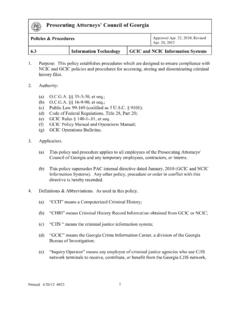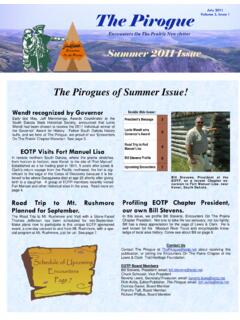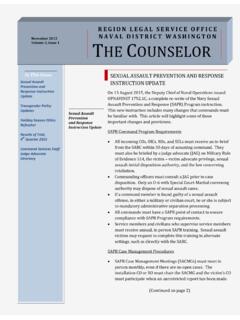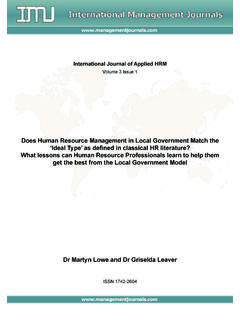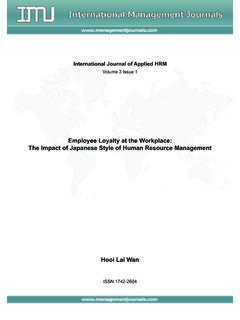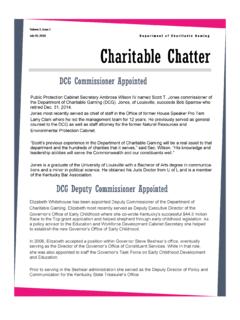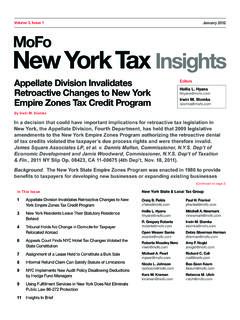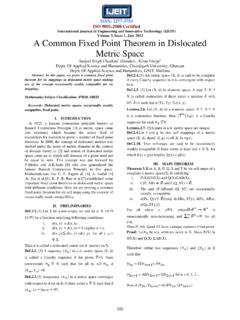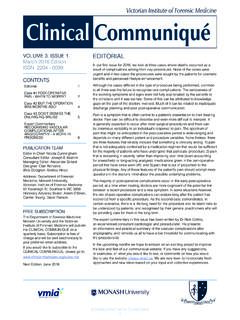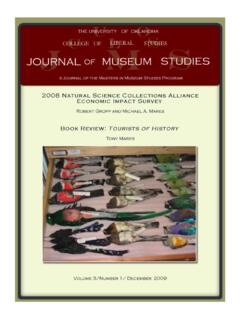Transcription of Georgia Family Violence Newsletter, Volume 3, Issue 1, 1st ...
1 Georgia Family Violence newsletter 1 Volume 3, Issue 1 FIRST QUARTER 2015 This newsletter is a publication of the Prosecuting Attorneys Council of Georgia and was made possible by a Grant from the Criminal Justice Coordinating Council. PAC encourages readers to share varying viewpoints on current topics of interest. We invite law enforcement, prosecutors and victim advocates to write an article for publication. The views expressed in this publication are those of the authors and not necessarily of the State of Georgia , PAC or the Council staff. Please send comments, suggestions or articles to Sharla Jackson at goal of PAC s Domestic Violence and Sexual Assault Program is to effectively assist and be a resource to prosecutors, law enforcement and victim advocates across Georgia ; to improve the effective adjudication of domestic and sexual Violence cases; and to reduce such crimes across our MissionIn this IssueForfeiture By WrongdoingBy Sharla D.
2 Jackson, Domestic Violence and Sexual Assault Resource Prosecutor, and Christopher Ivory, Intern, Prosecuting Attorneys Council of GeorgiaMany Family Violence cases rise and fall on a victim s availability or willingness to testify. When a defendant causes a victim to be un-available to testify through death, influence or intimidation, it can be devastating to the State s case. Although victims may be reluctant to testify for many reasons, the most common is pressure or influence by the defendant. Evidence-based prosecution using evidence to prosecute cases without victim testimony is the best practice; but there are times when the unavailable victim s testimony may be the most valuable piece of evidence. Fortunately, under Georgia Law, prosecutors can use the doctrine of Forfeiture by Wrongdoing to admit testimonial hearsay statements for those times when, through the actions of a defen-dant, the victim becomes equitable principle of Forfeiture by Wrongdoing is based on the premise that a defendant should not profit from his wrongful Relying on this doctrine, courts have held that a defendant s misconduct can forfeit his right to confront witnesses against Sixth Amendment of the Constitution honors a defendant s right to be confronted with the witnesses against him or her.
3 Under early common law, the admissibility of an absent witness s examination depended upon the unavailability of that witness and the defendant s prior opportunity to cross-exam-ine him or The Sixth Amendment incor-porates those However, when the defendant is the cause of the witness s unavail-ability, courts have approved the admission of hearsay latter exception to the Confrontation Clause s protections the defendant s miscon-duct in procuring the witness s unavailability to testify has its roots in the common law preceding the Sixth Amendment s In 1878, the Supreme Court recognized that a defendant s wrongful actions can forfeit his right to confront witnesses against him:The Constitution gives the accused the right to a trial at which he should be confronted with the witnesses against him; but if a witness is absent by his own wrongful procurement, he cannot complain if competent evidence is admitted to supply the place of that which he has kept law recognizes that [t]he Constitution does not guarantee an accused person against the legitimate consequences of his own wrong-ful acts.
4 [The Constitution] grants him the privilege of being confronted with the witness-es against him; but if he voluntarily keeps wit-nesses away, he cannot insist on his privilege. 7 Forfeiture By Wrongdoing Under Georgia LawThe doctrine of Forfeiture by Wrongdoing has long been followed by Georgia courts. In 1856, the Supreme Court of Georgia in Williams v. State, 19 Ga 402 (1856) held: ..any witness, who had been ex-amined by the Crown and was then absent, was detained by the means or procurement of the prisoner, and the Court should be satisfied from the evidence, that the witness was detained by means or procurement of the prisoner, then the examina-tion should be Supreme Court in Giles v. Califor-nia, 554 353 (2008), cited this historic Georgia case to support its holding and sup-port the doctrine of Forfeiture by Wrongdo-ing on domestic Violence While this doctrine has not been widely used in Georgia law, the drafters of the new Georgia Evidence Code did not eliminate this common law rule.
5 Rather, they codified it under 24-8-804(b)(5), which states: (b). The following shall not be excluded by the hearsay rule if the declarant is un-available as a witness:(5). A statement offered against a party that has engaged or acquiesced in wrongdoing that was intended to, and did, procure the unavailability of the declarant as a by Wrongdoingfeature articleheadlinesin every issueCaseLaw Update 4 Upcoming Training 3 Resources for Prosecutors 6 The equitable principle of Forfeiture by Wrong-doing is based on the premise that a defendant should not profit from his wrongful actionsGeorgiaResource NewsletterFAMILY THEVIOLENCEA PUBLICATION OF THE PROSECUTING ATTORNEYS COUNCIL OF Georgia DOMESTIC Violence AND SEXUAL ASSAULT PROGRAM WITH FUNDING FROM THE CRIMINAL JUSTICE COORDINATING COUNCIL2 Georgia Family Violence newsletter This Code section tracks the language of the Federal Rules of Evidence, USCS Fed Rules Evid R 804 (b) (6).
6 Further, the Editor s notes in the preamble to the new Evidence Code in-dicate the legislative intent that the common law will prevail unless the Code states other-wise, ..Unless displaced by the particular provisions of this Act, the General Assembly intends that the substantive law of evidence in Georgia as it existed on December 31, 2012, be retained. Therefore, prior cases that are not in conflict with the statute can be persua-sive By Wrongdoing CasesCourts have upheld the admission of evidence under this doctrine in myriad contexts. In Brittain v. State, 329 Ga. App. 689 (2014, the State sought to admit the hearsay statement of Chastity Jones, a murder victim. Jones husband had been implicated as a member of the defendant s restaurant robbery crew. Jones gave several videotaped statements to investi-gators after being kidnapped by the defendant and the murder of her husband. At a hear-ing on the motion, the trial court ruled that Ms.)
7 Jones statements to police investigators were admissible under this doctrine after the State showed through the testimony of fam-ily, friends and law enforcement agents that the defendant procured Jones unavailability to testify at trial. Citing Giles, the Court held that the doctrine of Forfeiture by Wrongdo-ing permits the introduction of statements made by a witness who has been detained or kept away by the means or procurement of the defendant. 10 Further, the Court held that al-though the case was tried in 2011, prior to the effective date of the new Evidence Code, the rule would still apply as the new Code codi-fied the Forfeiture by Wrongdoing exception for hearsay evidence and would be admissible at subsequent trial if the court were to reverse the courts have also looked favorably on the admission of evidence under this doctrine. In United States v. Montague, 421 1099 (10th Cir.)
8 2005), the 10th Circuit upheld the admission of hearsay testimony of the defen-dant s wife, who gave incriminating testimony to a grand jury about her husband. The defen-dant had been arrested for a domestic Violence incident at their home. During the investiga-tion, the defendant s wife related to police that the defendant, a convicted felon, was in pos-session of several guns. While testifying before the grand jury, the defendant s wife stated that she and the defendant talked about her chang-ing her story and that the defendant told her that she would not get into trouble if she did so. The State also presented evidence that the defendant and his wife spoke on the phone several times and that his wife visited the de-fendant on at least five occassions at the prison in violation of a no-contact order. At trial, she invoked her marital privilege and refused to testify. Citing the daughter s testimony that her mother was afraid of the defendant and the unauthorized visits to the defendant by his wife, the Court held that there was sufficient evidence presented to meet the preponderance standard and admitted the hearsay testimony.
9 The Court also held that evidence of a history of spousal abuse presented during the hearing was relevant to provide a better understanding of the relationship between the U. S. v. Jonassen, 759 653 (7th Cir. 2014), the 7th Circuit affirmed the mid-trial admission of hearsay statements of the de-fendant s 21-year-old daughter after the de-fendant s campaign of 75 phone calls; guilt; bribery; veiled threats; and 20 letters, in viola-tion of a no-contact order, caused her to be-come unavailable at trial. The court found her to be unavailable when, while on the witness stand, she suddenly clammed up when called to testify at trial, saying I don t remember or something equivalent in response to all of the prosecutor s questions. 13 Many other jurisdictions have also applied this doctrine to allow hearsay testimony in domestic Violence cases. In People v. Turnquest, 938 749 (Sup. Ct. Queens County 2012), a trial court ruled that the defendant forfeited his confrontation rights when it found that the defendant committed several acts in an effort to persuade the victim to not testify against him.
10 In violation of the court s no-contact order, the defendant called the vic-tim 348 times, came to her home uninvited on two occasions. and tried to get his friends and Family to contact the victim about drop-ping the charges against Supreme Court of Massachusetts upheld the application of the doctrine in Common-wealth v. Szerlong, 457 Mass. 858, (2010), where the defendant married the victim to enable her to exercise her spousal privilege, thereby making her unavailable to testify. Also, the Oregon Supreme Court, in State v. Supanchick, 354 Or 737 (2014), affirmed the trial court s admission of the victim s hearsay statements to the police when the defendant killed her to prevent her from reporting his violation of a restraining order. While these out-of-state cases are not binding precedent in Georgia , they offer an interesting framework for analyzing this By Wrongdoing and Family ViolenceIn the context of a Family Violence case, the doctrine of Forfeiture by Wrongdoing can be helpful when a victim becomes unavail-able to testify based on coercion, influence or intimidation by the defendant.
